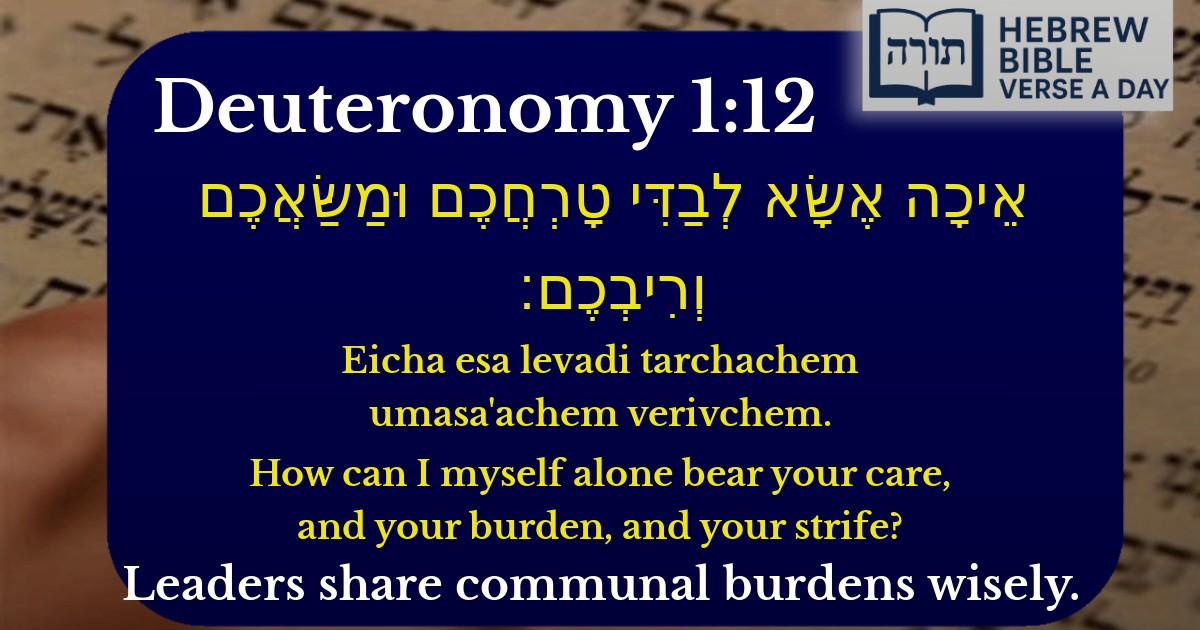Frequently Asked Questions
Q: What does Deuteronomy 1:12 mean?
A: In Deuteronomy 1:12, Moshe (Moses) expresses his difficulty in leading the Jewish people alone, bearing their burdens, disputes, and responsibilities. Rashi explains that this verse reflects Moshe's concern about the heavy responsibility of judging and guiding the nation by himself.
Q: Why is this verse important in the Torah?
A: This verse is important because it teaches the value of shared leadership and delegation. According to the Talmud (Sanhedrin 8a), Moshe's words led to the appointment of judges and leaders to assist him, showing that even great leaders need support in managing a community's needs.
Q: What lesson can we learn from Deuteronomy 1:12?
A: We learn that no single person should bear all responsibilities alone. The Rambam (Hilchot Sanhedrin 1:1) emphasizes the importance of establishing courts and leaders to share the burden of judgment and governance, ensuring fairness and preventing burnout.
Q: How does this verse apply to leadership today?
A: This verse teaches that effective leadership requires delegation and teamwork. Just as Moshe appointed judges (Deuteronomy 1:13-15), leaders today should distribute responsibilities wisely, ensuring that communal or organizational tasks are managed justly and efficiently.
Q: What does 'your burden and your strife' refer to in this verse?
A: Rashi explains that 'your burden' refers to the people's complaints and needs, while 'your strife' refers to their disputes requiring judgment. The Midrash (Devarim Rabbah 1:5) adds that Moshe felt overwhelmed by the constant demands of guiding and resolving conflicts among the Israelites.


Context in the Torah
This verse (Devarim 1:12) is part of Moshe Rabbeinu's address to Bnei Yisrael before his passing, recounting their journey through the wilderness. Moshe expresses the overwhelming burden of leading the people alone, prompting him to establish a system of judges (as described in the following verses).
Rashi's Explanation
Rashi explains the threefold burden mentioned in the verse:
Ibn Ezra's Insight
Ibn Ezra notes that Moshe's statement reflects the natural limitations of human leadership. Even a leader of Moshe's stature could not single-handedly manage all aspects of a nation's needs, emphasizing the importance of delegating responsibilities.
Midrashic Perspective
The Midrash Tanchuma connects this verse to the earlier incident where Yitro advised Moshe to appoint judges (Shemot 18). It highlights that effective leadership requires shared responsibility and proper communal structure.
Rambam's Application
In Hilchot Sanhedrin (1:1), Rambam derives from this verse the halachic principle that judges must be appointed in every Jewish community to handle disputes, continuing the model Moshe established in response to this challenge.
Spiritual Lesson
The Kli Yakar emphasizes that this verse teaches us about the importance of communal responsibility. Just as Moshe recognized the need to share leadership, every community member must participate in shouldering communal burdens rather than relying solely on individuals.